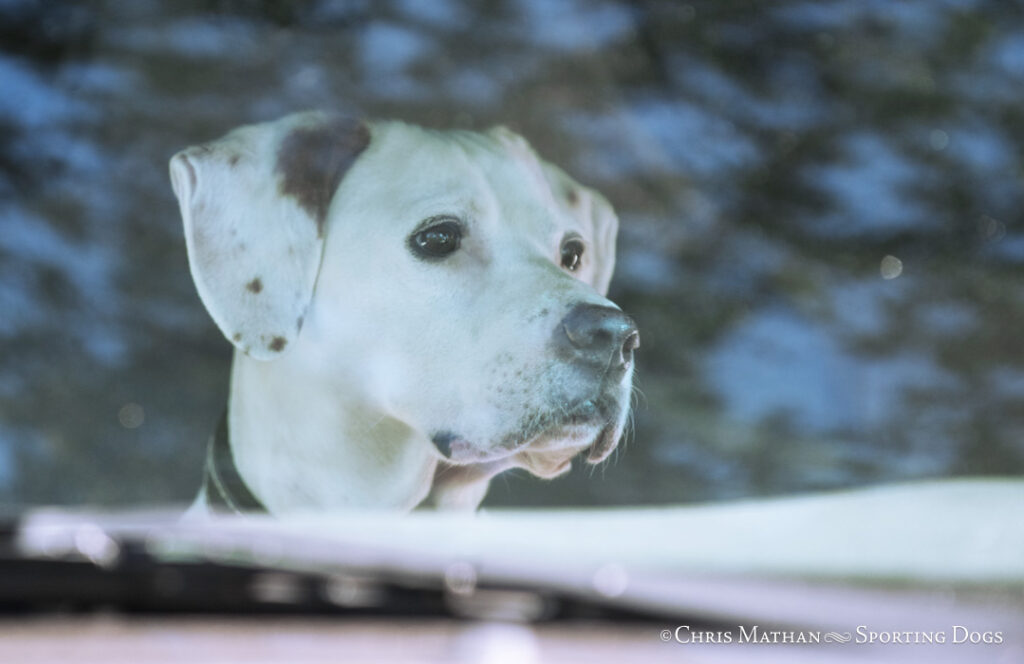There comes a moment in every good field trial bird dog’s life when it realizes its purpose: to win field trials with its handler. To that moment, it may understand its handler’s desire to have it do his or her will, but not the purpose of the handler’s desire. But the moment a dog comes to understand what it and its handler are trying to accomplish together, is the magic moment.
For Faye, the moment came in her second all-age year. Her handler was Ronnie Snead, the son of a Georgia shooting plantation dog man who trained dogs (pointing and retrieving) and horses and guided hunts for a wealthy Boston banker, the grandson of the man who bought the cotton land and pine forest to make up High Hopes Plantation from Georgia farmers and turpentines for $6 an acre before 1900.
Ronnie had apprenticed on High Hope as his father’s assistant for three years after high school. Then he had chaffed at saddling other men’s mounts and, with a bequest from a maiden aunt, struck out to try to be a for-the-public over-the-road all-age pointing dog trainer-handler.
He had been given Faye as a weanling pup by his father. Her dam was High Hope’s best wagon dog, her sire an all-age champion of note. Faye was Ronnie’s favorite in his limited string. She had won as a derby, then had a typically frustrating first all-age year.
Ronnie and Faye were at the Pheasant Championship in Ohio. He had entered Faye on a whim. Faye had come to love pheasants in South Dakota where Ronnie trained in July and August on land his father trained wagon dogs on for High Hope, but he had never run her in a pheasant trial.
Faye had run a fair race and scored two good finds in her hour. He did not expect her to be in the money. But to his surprise the judges called on her to go in a second series with a littermate sister named Madeline, handled by Ronnie’s high school baseball rival, Ralph Pogue.
Faye and Madeline had been rivals when they were nursing pups. When led to the line for their run off Madeline growled at Faye. Faye did not growl back, but Ronnie detected she had recognized her sister, her natural rival since birth.
When they were released, Ronnie detected something different in Faye. Her opening cast was spectacular, a deep, fast parenthesis curving counterclockwise and ending dead at the front with a find. When Ronnie saw Faye pointed he next saw Madeline backing thirty yards behind Faye.
Ronnie rode to Faye, cap raised, and flushed a cock pheasant six feet in front of her. It cackled as it lifted, but Faye moved not a hair. Ralph stood beside Madeline, and waited for Faye to be out of sight before releasing her. This told Ronnie what he had suspected, Madeline was a trailer. Faye made another spectacular cast, this time a parenthesis clockwise, ending at a second find on course five hundred yards ahead. Again Madeline was backing, this time from fifteen yards behind. This time it was a quail, released for an earlier trial. Faye’s style and manners were impeccable. The judges ordered the dogs up and declared Faye Champion. They had planned to name the brace-mate runner up, but that plan was cancelled. They conferred on the ride back to headquarters and on arrival had the chief marshal whistle up the gallery and announced another dog Runner-Up.
Faye never again rode in Ronnie’s trailer. She rode that day and every day after on the front seat of his dually beside Ronnie, for the rest of her seven more years in competition. She became that dog all handlers except her’s hate: a dog that understood what she and Ronnie were trying to accomplish together each time she was released with a brace-mate, and a dog that always knew where the front lay.

Great short story! Loved it!